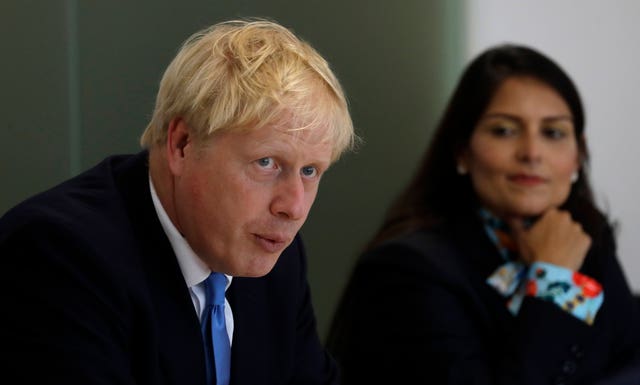Philip Rutnam has resigned from his post as permanent secretary. His departure comes after a series of clashes with home secretary Priti Patel.
Rutnam has alleged Patel belittled colleagues and led a “vicious and orchestrated” briefing campaign against him. In the wake of his resignation, the Westminster storm surrounding Patel has intensified. And Patel is said to be “absolutely livid” about allegations that she bullied staff and is distrusted by spymasters.
Unofficial meetings
But Patel is certainly no stranger to controversy. Her return to Government as home secretary in 2019, when Boris Johnson became prime minister, raised eyebrows. This is because in 2017, Patel was forced to quit Theresa May’s cabinet after having a series of unofficial meetings with the Israeli government.
 Priti Patel returned to Government as Home Secretary when Boris Johnson became Prime Minister in 2019 (Kirsty Wigglesworth/PA)
Priti Patel returned to Government as Home Secretary when Boris Johnson became Prime Minister in 2019 (Kirsty Wigglesworth/PA)
It emerged she had had a series of 12 meetings with senior Israeli figures, including the prime minister Benjamin Netanyahu, while on holiday in August 2017. Patel was international development secretary at the time. She held two additional meetings, one in the UK and one in the US, following her return from Israel.
Patel is widely believed to harbour leadership ambitions. And some Westminster watchers regarded the “freelancing” meetings with the Israelis as part of a possible drive to boost her personal contacts and standing ahead of an eventual pitch for the top spot.
When she resigned in 2017, she acknowledged that her actions “fell below the high standards” expected.
In a bizarre episode, thousands of people followed the progress of her plane as she returned from a trip to Kenya for the showdown with May which led to her exit from the government.
Dodgy views
Moreover, Patel’s appointment as international development secretary was greeted with concern by some in the aid community. They recalled that she had previously called for her new ministry to be replaced by a Department for International Trade and Development, with greater focus on boosting UK business opportunities in the developing world.
And in 2011, Patel’s views on the death penalty came to light. She used an appearance on Question Time to say she would “support the reintroduction of capital punishment to serve as a deterrent” to “murderers and rapists” who re-offend. Although in 2016, she told MPs that she did not support the death penalty.
So while this latest controversy is causing a stir, it certainly isn’t the first of its kind.

 Priti Patel returned to Government as Home Secretary when Boris Johnson became Prime Minister in 2019 (Kirsty Wigglesworth/PA)
Priti Patel returned to Government as Home Secretary when Boris Johnson became Prime Minister in 2019 (Kirsty Wigglesworth/PA)














